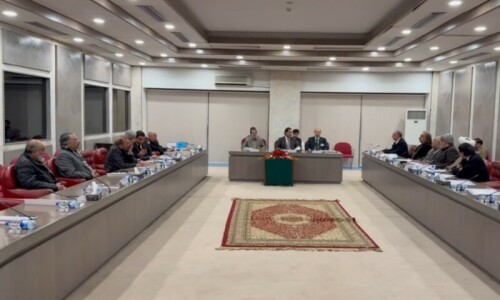I recently came across a news report about a simmering controversy over textbooks in the Punjab. An Islamiyat textbook had apparently committed the unforgivable sin of printing a photograph of a crucifix. You see, someone had mistakenly selected a picture of a church in Spain that used to be a mosque many centuries ago. Allowing such an image would, of course, be offensive to delicate Muslim eyes and so the textbook was being recalled.
Taken in isolation, this episode is not worth getting worked up about. A firm shake of the head, a silent tut-tutting and it’s time to move onto a juicy story about a bloated politician. Given what we know about the spread of an intolerant ideology, that has permeated not just education but is rapidly encompassing the entire country, however, and it becomes slightly more sinister.
Here is a modest suggestion for Pakistan Day. Instead of watching militarised parades on television, we might want to take a look at an ancient oft-referenced, seldom-read document. We all think we know what the Lahore Resolution of 1940 says. Like the Gettysburg Address and Martin Luther King’s “I Have a Dream” speech, the Lahore Resolution has permeated brains through a process of osmosis to the point where reading it no longer seems necessary to understanding what it contains.
Yes, as popular belief has it, the Lahore Resolution did lay the foundation for the birth of Pakistan. But there was a lot more to it. There is one specific sentence that the bigots may want to consider. The text of the resolution pointedly stated, “That adequate, effective and mandatory safeguards should be specifically provided in the constitution for minorities…”
Without a doubt, the Lahore Resolution was referring to the plight of Muslims in British India but it is striking to note how its framers and supporters couched their plea in the universal language of human rights. They asked the British not for special favours but to guarantee basic protections for all minorities, regardless of their religion.
The story of how we went from calls for tolerance to politicians being murdered for their views and faith is one of the oppressed becoming the oppressor and it began before Pakistan was even created. In his quest to carve a Muslim state out of India, Jinnah called for a Direct Action Day to pressurise the British to accede to this demand. In most of India, the Muslim League and its supporters were able to demand their rights in a non-violent manner. But in the Bengal, things turned ugly.
The Muslim League heightened tensions in the Bengal by overtly playing on people’s religious emotions. The Direct Action Day was to be held on a Friday and mosques were drafted to the cause. Comparisons were made between the establishment of the state of Pakistan and Prophet Muhammad’s (PBUH) bringing the Muslims to Makkah. Somewhat predictably, a bloodbath of the most vicious kind followed in Calcutta. While the Hindu community was as responsible for the violence, it had been sparked by a demagogic appeal to the religious sentiments of the Muslim population.
Once the Pakistan wish was granted, Muslims were suddenly in a position of great authority and it was greatly abused. The Objectives Resolution of 1949 explicitly put Muslims above minority communities by making Islam the final authority of the country’s laws. Just three decades later, political Islam was so ingrained in Pakistan even a practicing and preaching secularist like Zulfikar Ali Bhutto employed it in a futile attempt to save his rule. The subsequent regime of Ziaul Haq was only the final nail in the coffin; the woodwork had been constructed over the previous 40 years.
It is this history that makes me ambivalent about the Lahore Resolution. The document itself was a model of restraint and common sense, advocating an achievable solution to the repression of Muslims in the Indian subcontinent. But it now remains a mangled parchment that has justified the actions of cowards, bigots and opportunists.
Nadir Hassan is a journalist based in Karachi and can be found on Twitter.
The views expressed by this blogger and in the following reader comments do not necessarily reflect the views and policies of the Dawn Media Group.










































